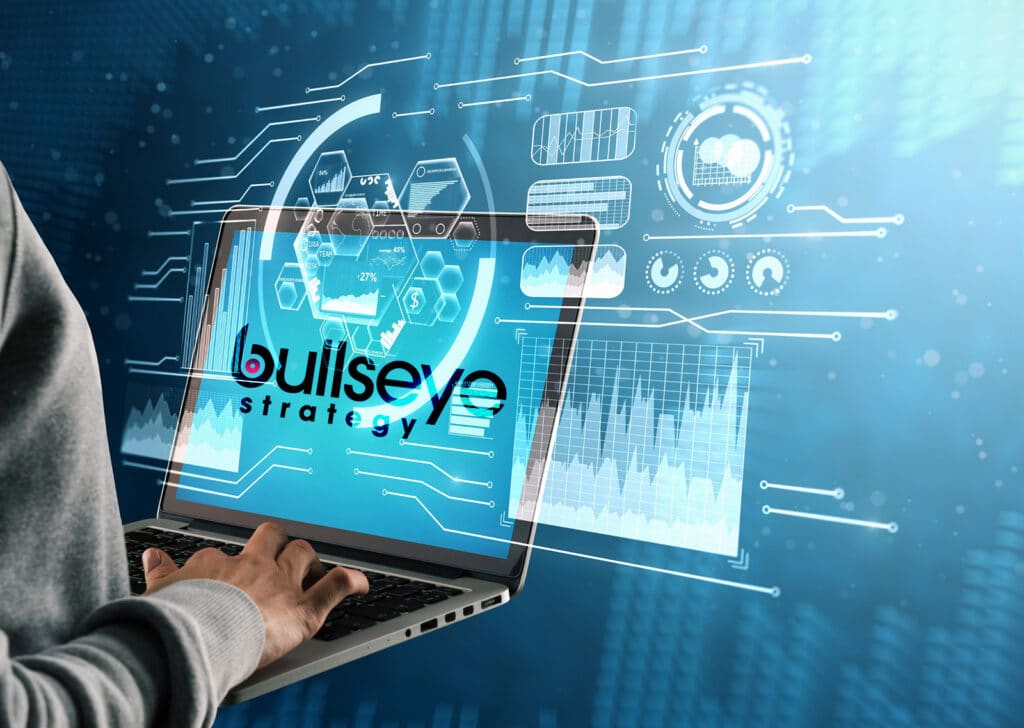The pervasive nature of artificial intelligence (AI) in digital marketing has reached such an extent that marketers may inadvertently encounter it without even being cognizant of its presence. From chatbots and personalized product recommendations to ‘people also ask’ results on search engines, artificial intelligence — and AI advertising — are ubiquitous in our everyday lives.
What is the mechanism behind AI advertising, more specifically in the context of paid media campaigns? Artificial intelligence can help you improve the performance of your paid search and social media campaigns. Here is what you need to know to leverage the power of AI advertising to generate, simplify, and optimize your paid media.
How AI Advertising Can Achieve Effective Ad Targeting
AI and advertising go hand-in-hand for several reasons, the primary being effective ad targeting. Like other artificial intelligence applications in marketing, AI ad targeting uses detailed algorithms to organize billions of data points into intent signals. Marketers can then use these intent signals to hyper-target their paid media and deliver highly relevant ads to the right audiences.
For instance, AI advertising powers granular data tracking, enabling marketers to pinpoint in-market and lookalike audiences quickly. For in-market audiences, AI applications scour the past search data of a user to determine if they’re a potential lead searching for your product or service.
For lookalike audiences, AI technology runs a series of algorithms to identify users who share similar online behavior or interests with the leads on your email list. AI technology can also compare users to current web visitors or past customers for ultra-accurate AI ad targeting.
However, those are not the only applications of AI ad targeting. AI technology can carry the entire media buying process from start to finish. Look at how AI advertising can help achieve more effective advertisements through programmatic buys and automated ad creation.
AI Programmatic Advertising
Programmatic advertising is an automated process to select and purchase ad space and time on digital platforms like websites and social networks. Artificial intelligence is integral to this process, as modern AI programmatic advertising uses algorithms to buy, sell, and place paid advertisements. AI advertising is also necessary to target and deliver ads in real-time.
The utilization of AI to oversee the procurement and trading of paid media has become a norm for all contemporary digital advertising exchanges, encompassing programmatic exchanges, third-party networks, and social media advertising platforms such as Facebook. AI’s employment regulates the purchase and sale of paid media. Because AI leverages algorithms for paid media, significantly less manual input, communication, and general human effort are involved.
AI Advertising and Generating Ad Content
If precise audience targeting and ad placement weren’t enough, AI advertising could enable automated ad creation to create highly engaging and relevant ads that drive conversions. All a marketer has to input are the appropriate keywords, phrases, or topics into the artificial intelligence technology, and the system can generate AI ad content that is best suited for the indicated goals.
Third-party tools using machine learning applications, such as natural language processing (NLP) and natural language generation (NLG), are frequently used to generate AI ad content. This content performs as well as, if not better than, copy written by humans, and it can be produced in a significantly shorter time frame.
This functionality of AI advertising is also present in specific social media marketing platforms. For instance, Facebook Ads Manager uses AI advertising to suggest which ads to run based on your current promotions. In addition, social platforms like Facebook also allow for dynamic creative optimization, a function of AI advertising that enables ads to adapt according to a user’s tastes.
With AI-powered dynamic creative optimization, marketers can generate ads that change color, layout, and design, all based on user preferences. As a result, AI-driven eCommerce advertising often uses it to serve users the most relevant product advertisements.
How AI Ad Optimization Can Improve Ad Performance

Beyond ad creation, ad optimization is critical to AI and advertising. AI ad optimization refers to an automated process to analyze ad performance across platforms, in which an AI tool provides recommendations on maximizing the return on investment (ROI). Marketers use AI advertising to identify performance issues and even eliminate the manual effort to correct them.
More advanced applications of AI advertising monitor ad performance and manage spend to help marketers reach their desired ROI and maintain a fully optimized budget. Other elements of AI ad optimization, like predictive bidding, determine how various changes in a cost-per-click campaign can affect both costs and clicks. In this way, AI advertising can minimize the cost per ad impression.
The Importance of Human Values Directing AI Advertising
AI for advertising is certainly nothing new; however, the wide variety of applications for artificial intelligence in marketing has given way to newfound AI ethical issues. At its core, AI advertising relies on algorithms and machine learning to produce results, but it requires a human at the helm. In other words, professional human guidance is still needed for AI advertising to be ethical.
Controversy surrounds AI advertising ethics. Today’s consumers are willing to provide some personal data to receive personalized marketing. AI advertising accesses this data to deliver timely, relevant content. Still, AI can use consumers’ data for unintended purposes without proper protocols.
The uncertainty about sensitive user data necessitates that a human directs AI advertising.
Human intervention is necessary to ensure that AI technology does not accidentally supply consumers with factually incorrect content — like false statistics or sales prices. At Bullseye Strategy, our core values of accountability and excellence help our marketers navigate the complexities of AI advertising ethics to safeguard user privacy and secure marketing accuracy.
Get Started with AI Advertising for Paid Search and Social
If you’re ready to experiment with artificial technology in paid search and social campaigns, contact the experts at Bullseye Strategy. We can harness the power of AI advertising to generate advertisements with the highest propensity to convert. Contact us today to get started.







